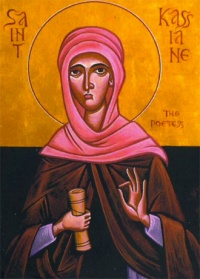Casiana Imnografa: Diferență între versiuni
(+sursa) |
(+imagine) |
||
| Linia 1: | Linia 1: | ||
{{Traducere EN}} | {{Traducere EN}} | ||
| − | Sfânta '''Casiana Imnografa''' <ref>Also known as '''Casiani''', '''Casia''', '''Icasia''', '''Kassiana''' sau '''Eikasia'''</ref> was a Byzantine [[ | + | [[Image:Kassiane the hymnographer.jpg|right|thumb|200px|Sf. Casiana Imnografa]] |
| + | Sfânta '''Casiana Imnografa''' <ref>Also known as '''Casiani''', '''Casia''', '''Icasia''', '''Kassiana''' sau '''Eikasia'''</ref> was a Byzantine [[stareţ]]ă, poet, composer de cântări bisericeşti. She is commemorated by the church [[7 septembrie]]. | ||
== History == | == History == | ||
| Linia 21: | Linia 22: | ||
==References== | ==References== | ||
| − | <small><references/><small> | + | <small><references/></small> |
==Sursa== | ==Sursa== | ||
Versiunea de la data 23 ianuarie 2011 22:09
| Acest articol (sau părți din el) este propus spre traducere din limba engleză!
Dacă doriți să vă asumați acestă traducere (parțial sau integral), anunțați acest lucru pe pagina de discuții a articolului. |
Sfânta Casiana Imnografa [1] was a Byzantine stareţă, poet, composer de cântări bisericeşti. She is commemorated by the church 7 septembrie.
History
Kassiani is one of the first composers whose scores are both extant and able to be interpreted by modern scholars and musicians. Approximately fifty of her hymns are extant and twenty-three are included in the Orthodox Church liturgical books. The exact number is difficult to assess, as many hymns are ascribed to different authors in different manuscripts and are often identified as anonymous. In addition, some 789 of her non-liturgical verses survive. Many are epigrams or aphorisms called "gnomic verse". An example:
I hate the rich man moaning as if he were poor.She was born between 805 and 810 in Constantinople into an wealthy family [2] and grew to be exceptionally beautiful and intelligent. Three Byzantine chroniclers, Simeon Metafrastul, George the Monk (a.k.a. George the Sinner) and Leon Grămăticul, claim that she was a participant in the "bride show" [3] organized for the young bachelor Teofil Iconoclastul by his stepmother, the Empress Dowager Euphrosyne. Smitten by Kassia's beauty, the young emperor approached her and said: "Through a woman [came forth] the baser [things]", referring to the sin and suffering coming as a result of Eve's transgression. Kassia promptly responded by saying: "And through a woman [came forth] the better [things]", referring to the hope of salvation resulting from the Incarnation of Christ through the Theotokos. According to tradition, the dialogue was:
"-Εκ γυναικός τα χείρω." (Ek gynaikós tá cheírō)</br>"-Kαι εκ γυναικός τα κρείττω." (Kaí ek gynaikós tá kreíttō)
His pride wounded by Kassia's terse rebuttal, Theophilos rejected her and chose Theodora as his wife.
The next we hear of Kassiani is that in 843 she founded a mănăstire in the west of Constantinople, near the Constantinian Walls, and became its first stareţă. [4] Although many scholars attribute this to bitterness at having failed to marry Theophilos and becoming Empress, a letter from Teodor Studitul indicates that she had other motivations for wanting a călugărească life. It had a close relationship with the nearby monastery of Studion, which was to play a central role in re-editing the Byzantine liturgical books in the 9th and 10th centuries, thus ensuring the survival of her work (Kurt Sherry, p. 56).
She wrote many hymns for liturgies; the most famous being the eponymous Cântarea Casianei, sung every Miercurea Mare (liturgically; actually chanted late in the evening of Joia Mare).
A se vedea şi
References
- ↑ Also known as Casiani, Casia, Icasia, Kassiana sau Eikasia
- ↑ Touliatos, Grove online.
- ↑ The Bride show was the means by which Byzantine princes/emperors sometimes chose a bride, by giving a golden apple to his choice
- ↑ "Other Women's Voices"
Sursa
Alte surse
- Diane Touliatos. "Kassia", Grove Music Online, ed. L. Macy (accessed February 12 2006), grovemusic.com (subscription access).
- Anna M. Silvas, "Kassia the Nun," in Lynda Garland (ed) Byzantine Women: Varieties of Experience 800-1200, Ashgate, 2006.
- Татьяна А. Сенина (монахиня Кассия). "Диалог Феофила и Кассии: литературная выдумка или реальность?" {Tatiana A. Senina (Nun Kassia), "Dialogue between Theophilus and Kassia: literary fiction or reality?"}, Scrinium. Т. 2: Universum Hagiographicum. Memorial R. P. Michel van Esbroeck, s. j. (1934–2003) / Ed. par B. Lourie et A. Mouraviev (Санкт-Петербург, 2006) 240–272
- Tatiana A. Senina (moniale Kassia), "Ἡ γυνή φιλόσοφος: S. Cassia de Constantinople et Platon," Scrinium. Т. 4: Patrologia Pacifica and Other Patristic Studies / Ed. par B. Lourié et V. Baranov (St. Petersbourg, 2008) 333–340.
